Content created: 2018-12-06
Open anthropology dictionary in new window.
Open world map in new window.
Ancient Greece
A Brief Introduction for College Students (3)
D.K. Jordan
Ancient Greece III:
Philosophers: Socrates, Plato, & Friends
There is no way in a simple world-civ course that there will be very much coverage of the wonders of ancient Greek philosophy (or art or technology or scientific insight), but most courses at least include a brief brush with Socrates, Plato, and Aristotle. And as it happens, these three are also mixed up with the story of Alexander the Great and the spread of what is called Hellenism. So that is what will be covered on this page.
Page Outline:
It is useful to begin by connecting Socrates to the events we have just been discussing in Athenian life. Here are the most important dates and events:
- 470 Socrates is born, nine years or so after the Persians have been driven out.
- In 462-463 or so Pericles seizes dictatorial power. Socrates is about seven or eight years old.
- 431 Sparta stops paying Delian dues and attacks Athens. Athenians, cowering within the walls of Athens, are struck by the Plague of Athens, referred to earlier. Pericles is among the victims. (That is probably good news in Sparta.)
- 431-404 the Peloponnesian War (lasting 27 years).
- Socrates would have been about 40 when it started and would have had strong opinions about it. He probably would have fought in it. (In the Charmides reading on this web site he has just returned from the wars.)
- Plato (born 428/427 or 424/423 BC, depending on who wants to know) would have grown up surrounded by war and the horrors that war inflicts on children.
- Aristotle (384-322) would not yet have been born.
- 401 Another coup is plotted by the oligarchs but fails.
- 399 Socrates, too friendly to too many coup plotters, is executed.
Return to top.
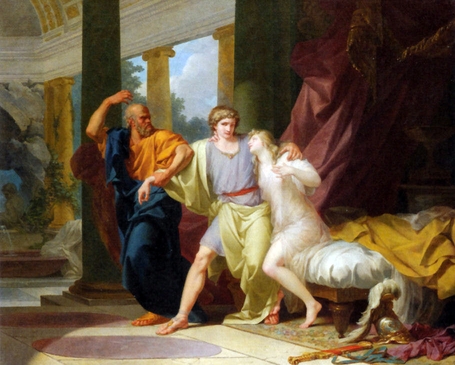
"Socrates Tearing Away Alcibiades From the Embrace of Sensuality"
(Jean-Baptiste Regnault, 1785, Smart Art Museum, Chicago).
Socrates' had friends and students throughout the controversial Peloponnesian War, some of whom were favorably disposed to the Spartans or even to the Persians (who were no longer much of a threat but still counted as bogeymen). Furthermore, many of them thought the decisions made by the Athenian Assembly often reflected the worst kind of mindless mob rule. This was usually true, but mindless mobs don't like being told that that is what they are, so it does not sit well if one says so in public. Of Socrates' politically unpopular friends we may specifically note the following. For some of them, brief extracts of their writings may be found on this web site (link).
- Plato was to become one of the most important influences on later Christian/European thinking. Google “platonism” if you really want to know about this. In Socrates’ circle, Plato was merely one of his many followers and admirers, who recorded most of what we know today about Socrates' thought.
- Xenophon (430±-350±) was another writer from whom we have learned about Socrates. An impressive polymath, Xenophon is known to history primarily for his account of his warfare against Persia on behalf of Persian upstart prince Cyrus the Younger, and his colorful military life thereafter. Socrates liked him, but seems to have regarded him as a pretentious spendthrift.
- Alcibiades was a handsome, high-born, charming, charismatic jerk who several times persuaded the Athenian voters to adopt ill-fated actions and several times betrayed Athenian interests to enemies. (He was also extremely keen on sex and tended to impregnate influential ladies and then flee when their politically important husbands took a dim view of this.)
- Critias and Charmides, both of whom we meet in a brief selection on this web site from Plato's "Charmides" (link), participated in a coup in 404 that overthrew the Assembly and instituted a short-lived oligarchic régime. (Oligarchy = "rule by the few.") Unfortunately, the régime soon made itself especially unpopular because it seemed to involve killing people who said bad things about oligarchy.
- Meno sold out the Athenian army to the Persian king. Perhaps just as annoying to many of the Assembly, he told them that, however wise they might be individually, collectively they were an idiot. (That of course tends to be true of large assemblies.) It would have done nothing for either Meno’s or Socrates’ popularity that Meno had also been the interlocutor to Socrates’ very public discussion of virtue —preserved by Plato. However, probably very few people knew or cared at the time.
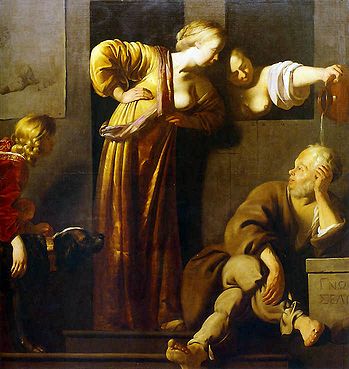
Xanthippe —“Mrs Socrates”— emptying a “vessel” over Socrates' head in a (typical and probably justified) fit of annoyance. (The artist has cleaned things up by showing a pitcher. Tradition holds that the “vessel” was a chamber pot.)
- Antisthenes was so frustrated by Socrates’ interest in demolishing all other arguments without offering any of his own that he (Antisthenes) ran off and founded the philosophical school of the “Cynics.” He was famous in his own day for noting that Athenians were so devoted to majority rule that they were perfectly capable of declaring all asses to be horses and then believing it to be true because the majority had voted that way. (Cynics generally recommended withdrawing from public life altogether, something like Chinese Daoists, but without the dào.)
- Socrates’ wife Xanthippe was said to have scolded him constantly for his shiftless wandering around looking for “truth” —or anyway arguments— instead of making money to support the family. She is said on one occasion to have concluded an enraged tirade by emptying a chamber pot over his head. Socrates responded calmly, “After the thunder comes the rain.” In the XVIIth-century painting shown here, Alcibiades is the middle-schooler with blond curls on the left. The woman in the middle with her hand on her hip is thought to be Socrates’ other wife, who took Xanthippe’s side. (In later centuries Xanthippe became a sometimes comic symbol of the shallow shrewishness of women in contrast to the reflective calmness of men, and by the 1600s this was nearly all ordinary Europeans knew of Socrates.)
Background themes through all of this were:
- Socrates’ (appropriate) disdain for “eristic rhetoric.” (Remember Eris, the goddess of discord, who threw the golden apple that led to the Judgement of Paris? That's where the English word "eristic" comes from. It means persisting in specious argument in order to be difficult or spread ill-will —something akin to what in the American south is called "argufying," i.e., aimless arguing). Speech should not be used for hell-raising, but to discover truth, Socrates maintained.
- Socrates’ belief that truth could be discovered through “dialectic,” which he thought of as a shared reasoning.
- Socrates’ (annoying) compulsion to attack all statements by pretty much anybody as illogical and leading away from truth.
All this sets the scene for Socrates’ trial, and provided background for the on-line passages from Xenophon and from Plato's Phaedo (link).
An article in The Economist in 2009 speculated about what Socrates would have thought of America in that year. Mostly, he would have hated it. Town meetings don’t lead to truth. Talking heads don’t lead to truth. Bombastic politicians don’t lead to truth. The Internet doesn’t lead to truth (except more or less by accident). (Americans, especially those fond of shouting, might or might not have made him drink hemlock.)
Although Socrates left no texts, others, notably Xenophon and Plato, wrote extensively of him. Five short selections from this material are available on this web site:
- Plato: Charmides Why You Are Wrong
- Plato:The Republic Why You Are Wrong
- Xenophon: Oeconomicus: On Estate Management How to Manage Money
- Xenophon: Memorabilia How to Live Frugally
- Plato: Phaedo: Death of Socrates
Return to top.
Aristotle & Alexander
Briefly, Aristotle was born in the year 384 BC in Stagira, a seaport town on the east side of the “little hand” of Greece, near the north end of the Aegean. The map below shows the place.
(Caution: There is a modern Greek province of Macedonia and also a portion of the former Yugoslavia briefly called the Republic of Macedonia and now the Republic of Northern Macedonia. It is called F.Y.R.O. Makedonia on this map. Both the republic and the Greek province occupy parts of ancient Macedonia. Sooner or later you will be able to dazzle somebody by knowing that.)
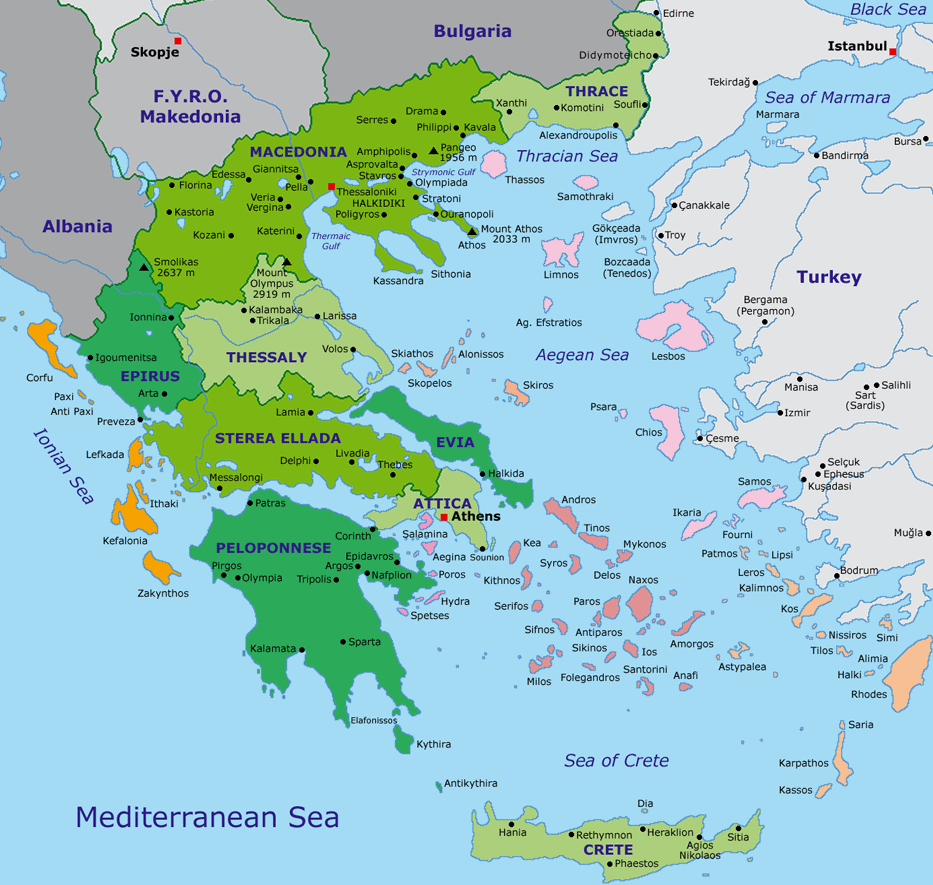
Aristotle’s father was a physician at the Macedonian court, suggesting that the family was well positioned, but his father died when Aristotle was a child, and his older sister’s husband Proxenus became the boy’s official guardian.
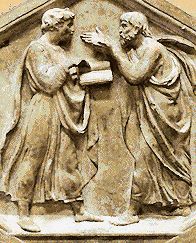
Uppety Young Aristotle and His Teacher Plato
The kid was obviously a prodigy, and like many prodigies, probably also a bit of a nuisance, so when he turned 17 Proxenus decided to send him to Athens for education (and perhaps to get him out of the house).
In Athens he became part of the “school” —usually known as the “Academy” because of its location in a district named after a forgotten hero named Akademos— that had developed around Plato, and he remained in Plato’s circle until the latter’s death in 347 (when Aristotle would have been 37!).
At Plato’s death, his students/disciples/associates, including Aristotle, contended to take his place as head of his school. Aristotle was generally regarded as the most promising mind among them, but he was not selected for the position.
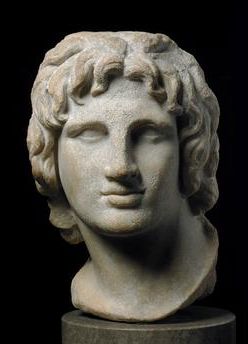
Alexander the Great
(British Museum)
(Alexander and Aristotle were apparently great friends despite the difference in ages.)
Aristotle left Athens and was invited to teach at the court of a tiny city-state called Mysia (on the south coast of Sea of Marmara in modern Turkey). Meanwhile his home town of Stagira had made some unfortunate political alliances, and in 348 Philip, the king of Macedon, razed it and enslaved the survivors.
Ten years later (after negotiations that it is difficult to imagine) Philip agreed to rebuild Stagira and manumit the slaves on condition that Aristotle agree to give up his post in Mysia and become the tutor to Philip’s 13-year-old son Alexander Αλέξανδρος, who, like Aristotle, was a prodigy and, also like Aristotle, was apparently turning into a bit of a handful.
Aristotle, now 46, agreed, so Stagira was rebuilt, the slaves were freed, and Aristotle set himself to the task of trying to civilize little Alexander, together with the offspring of various Macedonian nobles. (It worked out quite well. Alexander and Aristotle inter-prodigized and apparently enjoyed each other’s company immensely, and in their little school Alexander met his life-long side-kick —many say lover— Hephaestion Ἡφαιστίων.)
Some authors consider the Greek Classical period to have ended with the Battle of Chaeronea Χαιρώνεια in 338 BC, where Philip at the head of Macedonian forces, utterly destroyed the troops of a coalition of Greek states led by Athens and Thebes, forcing them into an alliance which he intended to use in the conquest of what is today Turkey. (Click me.)
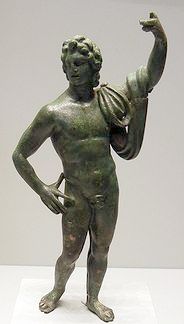
Alexander died in 323 BC, but this bronze and silver statue, made two hundred years later, still shows him proudly strutting. (Getty Villa Museum, Malibu)
It did not work out quite as planned. In 336, when Alexander was only 17, Philip was assassinated and his southern conquered territories immediately rebelled, convinced that the oddly vigorous but obviously boorish Macedonians, would never again have a good enough military commander to reconquer them.
They underestimated young Alexander. Never at a loss for self-confidence, Alexander quickly stepped into his father’s shoes and led troops southward to reconquer southern Greece. Once it was secure, he went on to conquer the rest of the world. (He took Aristotle’s grand nephew Callisthenes with him to record his glory for posterity. This did not end well. See below.)
(Moral 1: Don’t underestimate teenagers, especially if they hang out with smart mentors. Moral 2: Beware of clever people with armies.)
With Athens firmly in Macedonian hands once more (and resentful about it) and with Alexander away conquering the world, Aristotle moved back to Athens and founded his own school (the “Lyceum”), although his association with Alexander did not make him popular with most Athenians. When Alexander died in Babylon in 323, Athens instantly became a dangerous place for his friends, and Aristotle evacuated to the island of Euboea (pronounced you-BEE-ah, modern Evia), where he died the following year.
There are two very different extracts from Aristotle's writings on this web site, each with an introduction with additional comments about his life and thought. Link
Return to top.
Alexander & Hellenism
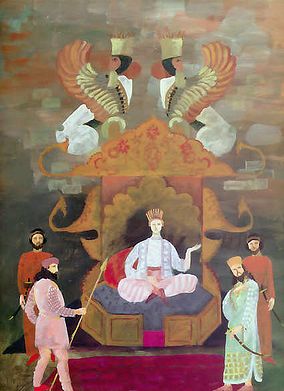
The picture here, from a modern Greek children's book, shows Alexander as king of Persia. It didn't work out well; Persians were accustomed to groveling but Greeks who came with him to Persia were annoyed when he made them do it too. English has borrowed the Greek term
proskynesis —προσκύνησις— for specifically Persian groveling. (Does English really need that word?!) Alexander's companion, Aristotle’s grand nephew Callisthenes, dared to be a nuisance on the subject of
proskynesis. He also dared to rebel and was executed for it.
Most world-history courses and textbooks cover Alexander's rise to power and his astonishing ability to conquer territory, make himself the monarch, found some cities to be named after himself, and then move on, leaving things in the hands of deputies. It is nice to know that all this happened; it is a lot harder to understand how it was possible.
Historians from Alexander's own time to ours have tried to account for his success, and have struggled to develop a moral evaluation of him. Many have little good to say about him. (For a good time, click here.)
It is hard to overestimate the enormous impact of “Hellenism” —“Grecification”— on all of the lands of the Mediterranean world, on Persia, and across central Asia.
- With the Persian threat eliminated —Alexander had made himself the king of Persia, after all, so even the most fretful Greeks didn’t need to fear Persians any more— and with the general pacification of large parts of the world, Greek colonies spread in ever greater numbers as Greeks moved to the conquered territories, where they tended to become a privileged class. (This produced growing inequality and a fair amount of resentment, as you might expect. Ninetynine-percenters tend to be annoyed by One-percenters. That has kept happening throughout human history, but One-percenters keep being surprised.)
Return to top.
- The self-conscious association of the ex-pats with their Greek-ness produced what one might call a “Greater Greece” or “commonwealth” mentality. (Linguistic Note)
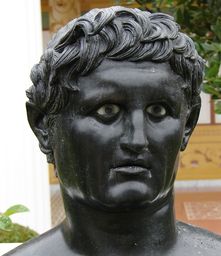
Alexander’s friend Seleukos I Nikator (ruled 312-280) was heir of the largest piece of his empire, including Mesopotamia and Persia.
(Getty Villa Museum, Malibu)
- Greek became the lingua franca of this world, but since for many speakers it was a second language, it tended to be pidgin-Greek in some areas, Greek creole in others (a bit like Broken English today).
To the extent that there was a standard, it was what is today called Koine (COY-neigh) Greek (or in some circles “New Testament” Greek, although the Greek of the New Testament in fact varies considerably from author to author).
The name Koine comes from koinos (κοινος), “shared, common.” (Similarly, the most common modern Chinese term for Mandarin is Pǔtōnghuà 普通话, “common speech.”) Generally speaking, specialists in Classical Greek regard Koine as degenerate at best, or at worst as entirely awful. This was the kind of Greek that Dionysius of Halicarnassus particularly hated. (He is on the list of Greeks you don’t need to remember in the Appendix on Geography. He struggled unsuccessfully to make Greeks love Romans and to teach Romans to speak proper Greek. Neither project worked. Forget him. Everybody else did.)
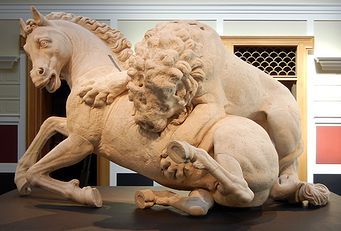
The motif of a lion attacking a horse or ungulate was already ancient in Mesopotamia. Alexander sometimes affected a lion skin in imitation of Hercules, so sculptures like this one became popular in the Hellenistic world as fawning Hellenistic jingoists interpreted the age-old motif as Alexander-the-Lion conquering all nations. This life-size sculpture, made about 300 BC, was plundered 300 years later by the Romans (who also loved the idea of lions ripping up other animals) and was displayed in various locations in Rome from antiquity until it entered the collections of the Capitoline Museums in 2012. This picture was taken while it was on loan to the Getty Villa Museum in Malibu, its first time out of Italy since the Romans had carried it home with them.
- Despite some resentment of Greeks by the peoples whom they moved in on, their culture was nevertheless also admired:
- parents who complained of Greek domination struggled anyway to get their kids into Greek schools;
- people, even when suspicious of Greeks in general, got attracted to temples of major Greek cults;
- people attended Greek dramas (or anyway today's lovers of Greek literature assume that they did);
- a new form of literature, the novel, appeared in Greek and apparently circulated widely among those who could read. (Click here for amusing diversionary expansion.)
Modern colonialism is similar in some respects —when Queen Elizabeth II was crowned in 1952, one of her titles was "Empress of India"— and one can imagine people in Baghdad or Persepolis wanting to be both Greek and non-Greek rather the way people in Delhi or Hong Kong often still want to be both British and non-British.
- The great Hellenistic states were not immune to rebellion or to military instability around their edges. Everywhere brigands and pirates plagued the trade routes, capturing goods and slaves, just as they had in previous eras and just as they do in unstable regions of the world even today. And democracy, in Athens, as in other southern peninsular Greek regions, was mostly merely a (romanticized) memory of life centuries earlier.
Return to top.
Romans
It is interesting to ask why Hellenism did not move into the western Mediterranean. A certain King Pyrrhus of Epirus, an acclaimed general, in 280 BC actually did invade Italy to take on “barbarian” Romans at the request (he claimed) of Greeks living in Taras (Τάρᾱς, modern Taranto; at the top of the “heel” of the Italian “boot”). He fought a long series of skirmishes with the Romans and even came within about 40 miles of Rome, but quit in 274 after his army, although mostly victorious, was also mostly dead. (Victories so costly that they destroy the victor are still called “Pyrrhic victories” in memory of him.)
The Romans not only conquered the whole of Italy, Greek colonies and all; they also took over Greece itself, sweeping eastward in ways you learn about in courses on Rome, not on Greece. And, like their predecessors, as they conquered they looted. Much of what they took from Greece, not counting gold and slaves, was art, including statuary.
Inevitably they noticed that the Greek statuary was much better than their own. So was the gold work. So was the weaving. So was the wine. So was the food. So were the ceramics. So even were the slaves, who brought unforeseen refinements in household arts and agricultural techniques. Many slaves were even literate.
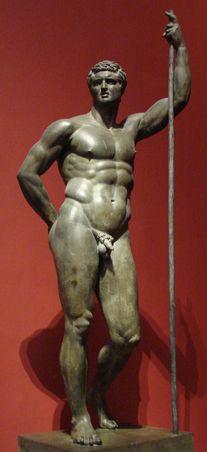
"Hellenistic Ruler"
(Roman Copy, Pushkin Museum, Moscow)
This clumsily over-masculinized statue fits well with the early Greek emphasis on male glory-seeking through physical competition and its continued salience through later Greek times.
It's not quite accurate to say, as people (including me) often do, that the Romans had an inferiority complex about the Greeks. They knew they could flatten all Greece at will in a military encounter. And they were not above negative stereotypes about Greeks, who were often thought of both as duplicitous and as gullible. (Pliny the Elder commented in his Natural History, "It is really wonderful to what length the credulity of the Greeks will go. There is no falsehood, if ever so barefaced, to which some of them cannot be found to bear testimony." [Bk. 8, Ch. 34].)
Nevertheless, most Romans very much wanted to see themselves as the continuers rather than the destroyers of Greek culture. Spoken and written Koine in various forms never died in the Roman eastern provinces. In contrast, Latin never took hold there. (And Romans, unlike modern classicists, thought Koine was not barbaric, but wonderful, soppy novels and all.)
The Roman poet Horace summed it up: "Greece, captive, seized her fierce conqueror, and waged the arts against unsophisticated Latium" (Graecia capta, ferum victorem cepit, et artes intulit agresti Latio).
The Latin-speaking Western part of the Roman empire collapsed in AD 476; but the Greek-speaking east survived until 1453, nearly a thousand years later, and just 39 years before Columbus sailed to the Americas. Greater Greece wasn't up to the standard of Greater China, quite, but it was pretty impressive.
Return to top.
Go to
1. Early History,
2. Later History,
3. Philosophers (this page).
Go to
4. Appendix: Values,
5. Appendix: Geography.
Background Design: Greek Stone Inscription, about 100 BC, from Ephesus in Modern Turkey










